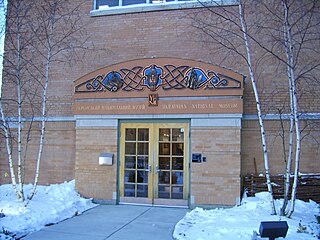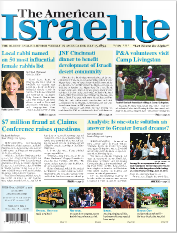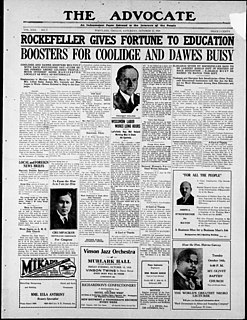
Stars and Stripes is a daily American military newspaper reporting on matters concerning the members of the United States Armed Forces and their communities, with an emphasis on those serving outside the United States. It operates from inside the Department of Defense, but is editorially separate from it, and its First Amendment protection is safeguarded by the United States Congress to whom an independent ombudsman, who serves the readers' interests, regularly reports. As well as a website, Stars and Stripes publishes four daily print editions for U.S. military service members serving overseas; these European, Middle Eastern, Japanese, and South Korean editions are also available as free downloads in electronic format, and there are also seven digital editions. The newspaper has its headquarters in Washington, D.C.

The Holodomor, also known as the Terror-Famine and sometimes referred to as the Great Famine, was a famine in Soviet Ukraine from 1932 to 1933 that killed millions of Ukrainians. The term Holodomor emphasises the famine's man-made and intentional aspects such as rejection of outside aid, confiscation of all household foodstuffs and restriction of population movement. As part of the wider Soviet famine of 1932–33 which affected the major grain-producing areas of the country, millions of inhabitants of Ukraine, the majority of whom were ethnic Ukrainians, died of starvation in a peacetime catastrophe unprecedented in the history of Ukraine. Since 2006, the Holodomor has been recognized by Ukraine and 15 other countries as a genocide of the Ukrainian people carried out by the Soviet government.
Dzerkalo Tyzhnia, usually referred to in English as the Mirror Weekly, was one of Ukraine's most influential analytical weekly-publisher newspapers, founded in 1994. On 27 December 2019 it published its last printed issue, it continued its life as a Ukrainian news website.

The Catholic Telegraph is a monthly magazine published by the Roman Catholic Archdiocese of Cincinnati primarily for its 500,000 congregants. The archdiocese covers 19 counties in Ohio, including the Cincinnati and Dayton metropolitan areas. Originally a weekly newspaper, the Telegraph has published continuously since 1831, except for a brief period in 1832, making it the first diocesan newspaper and second oldest Catholic newspaper in the United States. The Telegraph became a monthly newspaper in September 2011 and began publishing in magazine format in June 2020.

Ukrainian National Museum (UNM) is located in the historical Ukrainian Village neighborhood of Chicago, United States. It is home to a plethora of Ukrainian artifacts, artwork, musical instruments, and embroidered folk costumes among its growing collection.

Denial of the Holodomor is the claim that the 1932–1933 Holodomor, a large-scale man-made famine in Soviet Ukraine, did not occur or diminishing the scale and significance of the famine. Official Soviet propaganda denied the famine and suppressed information about it from its very beginning until the 1980s. It was also circulated by some Western journalists and intellectuals. It was echoed at the time of the famine by some prominent Western journalists, including The New York Times' Walter Duranty and Louis Fischer. The denial of the famine was a highly successful and well orchestrated disinformation campaign by the Soviet government. According to Robert Conquest, it was the first major instance in which Soviet authorities adopted the Big Lie propaganda technique in order to sway world opinion, and it was followed by similar campaigns with regard to the Moscow Trials and the denial of the existence of the Gulag labor camp system.
The Detroit Tribune a newspaper in Detroit, Michigan, United States, was started as the Daily Tribune in 1849 and used the name until 1862. In 1862 the Tribune joined with the (Detroit) Daily Advertiser which then absorbed other papers, becoming the Advertiser and Tribune.

The American Israelite is an English-language Jewish newspaper published weekly in Cincinnati, Ohio. Founded in 1854 as The Israelite and assuming its present name in 1874, it is the longest-running English-language Jewish newspaper still published in the United States and the second longest-running Jewish newspaper in the world, after the London-based Jewish Chronicle.

The Advocate was a four page weekly newspaper in Portland in the U.S. state of Oregon, established to cover issues relating to racial minorities. It was founded in 1903; microfilm of the paper is available through 1933, and the paper was covered as an active entity in other Portland press until at least 1936. The Advocate was known as Portland's second oldest black newspaper. In 1933 when the paper ceased publication it was the only remaining black-owned newspaper In its early days it was known as the Mt. Scott Herald and possibly as the Beaver State Herald. The Advocate covered a variety of topics for both the white and black communities in Portland. The Advocate mainly covered segregation, lynching, employment opportunities and other issues at the beginning.




